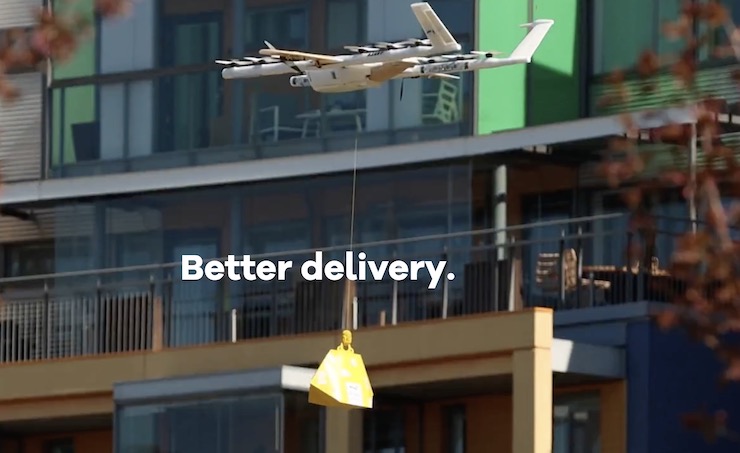Can Wing’s New Delivery Network Solve the Problem of “Scalability”?

© Wing.com
The issue of “scalability” continues to loom large in the US drone industry. U.S. retailers like Amazon and Walmart that are currently experimenting with “last mile” package deliveries by drone still lack a viable financial mode to support them. Currently, the companies respond to individual customer orders in a highly circumscribed service area and send their drones out to fill them – one customer and one drone flight at a time. The cost of these ad hoc unplanned drone deliveries exceeds that of road vehicle deliveries by a substantial margin. And yet, the companies, hoping to generate interest in the new service. still just charge their customers a modest delivery fee, usually $3.95 or less.
Operating at a deficit in this fashion may be fine for the pilot phase – to get the operation up — but it’s simply not sustainable long-term. The companies would need an entire fleet of drones, controlled by a single remote manager, and operating across a much wider geographic distance, to achieve scale, drone industry experts say. But a combination of constraints – mostly regulatory, but also technological – have hampered progress in this direction thus far.
Wing, a subsidiary of Google’s parent company Alphabet, says it may have solved the scalability problem. The company has conducted thousands of routine delivery operations across Australia for years – and with great success. But Australia has looser regulatory requirements on long-distance Beyond Visual Line of Sight Operations (BVLOS) than the US and the company already uses fleets of drones to deliver goods to store customers all over the country. Another critical advantage: The company isn’t necessarily tied to a single retailer, so its drones can pick up orders from multiple sources and fill them consecutively throughout the day, remaining continuously airborne, pausing briefly to briefly recharge or swap their batteries, as needed.
Wing, which recently began operations in the Dallas-Ft. Worth area with Walgreens, dubs its emerging model the “Wing Delivery Network.” Rather than create entirely new and single company dedicated drone delivery routes, Wing suggests piggy-backing on existing curb and roadside systems already in place and expanding at restaurants and food stores nationwide. Drones would be available to launch and land in designated parking spaces or office rooftops, picking up and delivering goods, even automatically, without the need for employees on hand to load and unload the cargo. Once a delivery is complete, the drone would become immediately available for more deliveries from companies and customers located anywhere in the same operating service area.
CEO Robert Woodruff compares the Wing Delivery Network to popular ride-sharing systems, in which customers identify vehicles in an operating radius that can service them, and the driver nearest to their location generally responds, regardless of the customer’s destination. Vehicles are utilized efficiently and provide customers with the fastest service possible. Woodruff says the same system could also work with drones, but would also require a network of battery charging stations in place to keep the aircraft airborne, with only brief delays.
“The only future for drone deliveries is a level of scale commensurate with what you find in other sectors. This means millions and millions of boxes delivered every day,” Woodruff says.
Woodruff recently testified before the U.S. Congress seeking federal support for more drone regulatory waivers from the Federal Aviation Administration (FAA) for companies like his to fly Beyond Visual Line of Sight (BVLOS) authority, which is still a bone of contention between the FAA and industry stakeholders. Currently, the FAA issues these waivers selectively, usually for one drone company at a time, for limited range operations. The waivers generally require drones to be remotely piloted and in some cases, their flights closely monitored. Without expanded BVLOS authority, the Wing Delivery Network is unlikely to come to fruition.
Wing is not alone in seeking fresh solutions to the scalability problem. Walmart and its drone partner, DroneUp, recently succeeded in getting the Florida state legislature to pass a bill that would allow for the establishment of drone hubs and docking stations between Walmart’s ubiquitous store outlets to facilitate more continuous long–distance drone deliveries. Drone Up drones would no longer be required to return to a single store outlet but could service multiple outlets, stopping at a docking station to recharge its batteries, as needed. Walmart has also partnered with the technology firm Iris Automation to create an ground-based sensor network that would allow Drone Up drones to better detect and avoid human and physical obstacles along pts expanded delivery routes, enhancing drone safety. The bill, the first of its kind in the nation, is expected to be signed into law by Florida governor Ron DeSantis, a huge drone industry supporter, sometime next month.
|